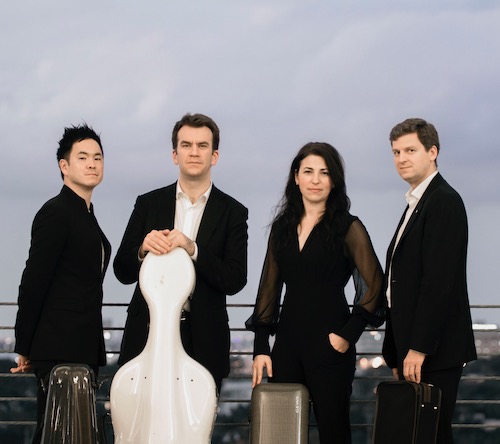Ehnes Quartet wraps Beethoven cycle with insight and distinction

The 251st anniversary of Ludwig van Beethoven’s birth was celebrated in high style by the Friends of Chamber Music on Thursday night with the conclusion of a nearly decade-long cycle of the complete Beethoven quartets by the Ehnes Quartet.
An enthusiastic audience at Florida International University’s Wertheim Performing Arts Center awarded violinist James Ehnes and his colleagues repeated ovations and for good reason. Their performances of Beethoven’s chamber works have yielded some of the most insightful music-making of recent seasons. Combining splendid ensemble skills and scrupulously musicality, these players have consistently delivered top-drawer performances and this final installment was no exception.
As in previous programs, the concert featured works from Beethoven’s early, middle and late compositional periods. The String Quartet in F Major, Op. 18, no.1 is the master’s first published quartet and, already, his distinctive creative voice is strongly assertive. From the remarkably bold statement of the opening bars, the composer’s fingerprints are vividly evident, the score immediately differentiated from Haydn and Mozart’s contributions to the genres. The players’ taut reading of the first movement emphasized the music’s edgy tension. A stalwart leader, Ehnes’ singing tone and technical brilliance was matched by his depth of musicality. Joining the group for the tour, violist Matthew Lipman’s dark tonal compass added strength to the string sonority while melding seamlessly with his colleagues.
In pre-performance remarks, Ehnes suggested that the Adagio affectuoso ed appassionato (second movement) was inspired by Shakespeare’s Romeo and Juliet. Whatever the provenance, the soaring tonal compass and intensity of expression radiated by the foursome was moving and dramatic. The Scherzo finds Beethoven at his most Haydnesque with abrupt pauses and surprising thematic paths. Bringing out the wit and subtlety of the melodic lines, the musicians’ contrasts of dynamics greatly enhanced the music’s verve and sparkle. Taking a slower tempo than many groups in the finale allowed the motivic cells and individual lines to shine with greater clarity.
Ehnes quoted Igor Stravinsky as saying that Beethoven’s Grosse Fuge, Op. 133, “forever will be modern music.” Indeed the score’s dissonance is path-breaking, foreshadowing the creative route of composers centuries later. In a performance marked by relentless drive, emotional velocity and restless energy, there were also moments of grace and restful solace in the slower interludes. With clean articulation and pristine intimacy of exchanges between instruments, Beethoven’s singular originality that changed music history was strikingly evident.
The Quartet No. 9 in C Major, Op. 59, no. 3, is the last of the Razumovsky quartets. Containing suggestions of the heroic Beethoven (of the “Eroica” symphony), elegance and vivacity were astutely mixed in the acceleration of the first movement’s Allegro vivace. The instrumental balances were well-nigh perfect. Over cellist Edward Arron’s plucked figures, Ehnes, Lipman and violinist Amy Schwartz Moretti played the Andante con moto quasi allegretto’s grave melody, their inflection and phrasing probing the theme’s grave depths. A Menuetto marks Beethoven’s return to courtly dance patterns and the expansive melodic writing was imbued with warmth and silken hues. The finale was taken at a brisk clip, at times hard-driving and fierce. Beethoven’s fearless originality and unbridled exuberance was highlighted at every turn of phrase.
The Ehnes Quartet’s multi-season Beethoven cycle has been greatly rewarding. This series was an important contribution to South Florida’s cultural life and a real artistic coup for Friends of Chamber Music president Julian Kreeger. Ehnes thanked him and the audience profusely for their support.
Friends of Chamber Music presents the New York Philharmonic String Quartet 8 p.m. January 17, 2022. The program includes Beethoven’s Quartet in F minor (Serioso), Joel Thompson’s In Response to the Madness, Webern’s Langsamer Satz and Schumann’s Piano Quintet with pianist Joseph Kalichstein. miamichambermusic.org
Posted in Performances
Leave a Comment
Fri Dec 17, 2021
at 12:03 pm
No Comments






